Update: Pricing Released–Starting at $36,550
 Editor’s Note: Nissan wanted us to drive the New Leaf Plus so bad that they flew us down to San Diego, put us up in a nice hotel and fed us and gave us a brand-new Leaf to drive. Pricing was just released March 1)
Update: Nissan’s Leaf S Plus starts at $36,550. The S Plus model is followed by the SV Plus at $38,510 and the SL Plus at $42,550, reflecting higher levels of standard equipment as detailed in the Specs we have revealed in a story here. A destination charge of $895 is added to those prices. Nissan also clarified that the 226-mile range can only be expected on the S model. The SV and SL are EPA-rated at 215 miles. Since this article was originally posted, Tesla has also released its $35,000, 220-mile range Standard Model 3, so we’ve updated the comparison notes below.
As the Nissan Leaf enters its ninth year of production, it remains the best-selling battery electric vehicle (BEV) in history with more than 360,000 units sold globally since 2010. The electric car world is quite a bit different than it was back when there were only two EVs on the market. Nissan has upped its game to stay competitive in the near future when there are expected to be over 20 BEVs on the market globally.
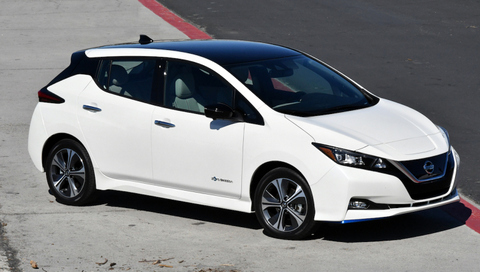
The 2019 Nissan Leaf Plus builds on the second generation of the Leaf introduced last year, making it very competitive with every other BEV in the mainstream market. When considering a BEV, its range is always the first metric; the Leaf Plus joins the 200-mile range club with an EPA rating of 226 miles from a new 62-kilowatt-hour (kWh) battery. Like the currently available 40-kWh battery Leaf, the Plus has the same three trim levels—S, SV and SL. The American-made Leaf Plus will be manufactured alongside the 40-kWh Leaf in Smyrna Tennessee.
What’s New
The 2019 Leaf now comes in two battery sizes, the 40-kWh, 150-mile-range version, which remains unchanged, and is still one of the lowest-priced BEV on the market today, starting under $30,000 (for the shorter-range version), and the new 62-kWh, 226-mile-range version. But the battery wasn’t the only change.
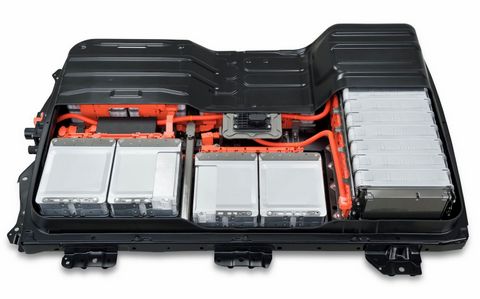
The new battery fits into the existing undercarriage battery space and is just 40 millimeters taller. It is still passively cooled, but uses a new architecture and battery chemistry that allows lower cell resistance and cooler battery operating temperatures. The cell spacing is much denser with 288 cells in the battery pack, and stacks of cell pouches are three high vs. two high in the 40-kWh pack. Nissan has adopted a new cell laser welding process and lowered the cell resistance by dividing output/input current by a third to reduce pack heat. This new pack is an evolution of Nissan’s passive battery thermal management that has continued to increase pack reliability and long-term durability. The new pack architecture reduces its parts count and is cheaper to manufacture.
More Powerful Motor
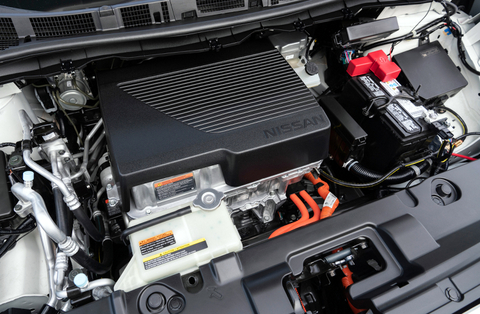
The 2019 Nissan Leaf Plus motor is the same size as the 40-kWh Leaf, but has been tweaked to add 46 percent more power. The new motor clocks in at 214 Horsepower (160-kilowatts) and 251 pounds-feet of torque. This extra grunt is immediately noticeable; putting the pedal to the metal creates a healthy dose of neck-snapping. While we weren’t able to check 0-60 in our test drive, we expect it to be at least 10 percent faster than the 40-Wh’s 7.4-second times. That could put the Plus in 6.6-sec. territory, which isn’t precisely Model 3 Performance mode, but is half as fast, which makes sense since the Plus will probably come in at half the cost of a Model 3 Performance (currently starting at $50,350). We will have to wait and see if you can actually buy two Leaf Plus’ for the price of one Model 3 Performance! Now that would be a real performance for your pocketbook. E-Pedal and multiple options for range or power control are standard on all Leaf Plus trim levels.
Faster DC Quick Charging Speed
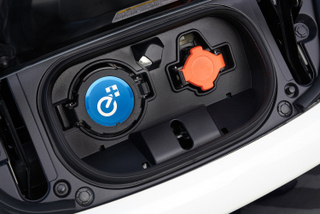
The 2019 Nissan Leaf Plus is compatible with the newest 100-kW peak CHAdeMO standards. This more powerful CHAdeMO is just now being rolled out. While it can offer peak charging of 100 kW, its nominal power is more like 70 kW. This added power will optimally allow the 62-kWh Leaf Plus to charge to 80 percent in 45 minutes vs. 1 hour with the old 50-W CHAdeMO chargers. The Leaf Plus also has the revised battery management system software that uses a less aggressive charge taper to make fast charging as efficient as possible. All Leaf Plus trim levels receive this new faster CHAdeMO capability. Level 2 240 V charging remains the same at 6.6 kW, and all Leaf Plus trim levels come equipped with the 110v-240 V EVSE standard.
Safety, Driver Assist, and Autonomous Features
The SL trim of 2019 Nissan Leaf Plus is fully equipped with every possible feature available on a Leaf today, including ProPILOT Assist (steering assist, intelligent cruise control), emergency braking with pedestrian detection, intelligent lane intervention, high-beam assist and rear cross-traffic alert. These features are optional on the Leaf Plus SV.
New infotainment systems
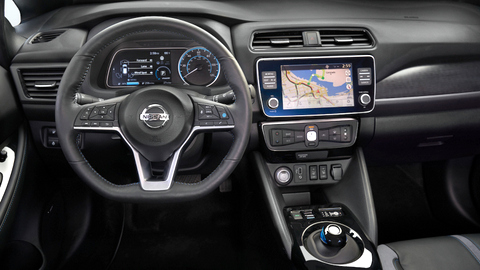
For all trim levels, the Leaf Plus offers an upgraded infotainment system that provides over-the-air (OTA) software and navigation updates. This update capability is the first step in Nissan offering vehicle software updates OTA. The infotainment head units offer a larger eight-inch screen with Apple CarPlay and Android Auto standard. The Infotainment interface is more customizable now with a better icon-based interface. The human-machine interface (HMI) is more intuitive with multi-touch gesture control like a smartphone. A feature of the infotainment system is Nissan Connect, which allows control of the vehicle for charging, cabin preheating and cooling, locking and unlocking as well as other optional subscription features. Nissan Connect EV is available through a smartphone or watch, and from home through Amazon Alexa and Google Assistant.
A new Leaf driving experience
The first-generation Leafs were not exactly hot rods, though the instant torque and 100 percent power availability at 0 rpm compensated for that. The new 2019 Nissan Leaf Plus has recalibrated its driving dynamics. Not only is off-the-line performance much better (where you will get pinned in your seat on takeoff), but all of the handling and road dynamics are improved, too. The car is 286 pounds (130 kilograms) heavier and is slightly higher off the ground, but with those changes, the suspension was changed to give a much firmer, but not harsh, ride. Steering feel is much improved, but could be a bit firmer for our taste. Especially improved are driving dynamics in the 50-75 mph range to allow you to make that pass or quick lane change. Cutting and slicing through traffic with the Leaf Plus is very satisfying. On-ramp acceleration and merging into traffic is noticeably faster than with the Gen one and 40-kWh Leaf. We didn’t get to quantify 0-60 times, but our calibrated tush-o-meter indicated that it was in the mid-to-high six seconds. The drive quality on the new Leaf Plus is also improved. The car is significantly quieter than the 2018 40-kWh Leaf, not only in wind noise, but also road noise. The SV and SL still use Michelin tires, but they might be an improved compound. The SL and SV ride on 17-inch rims and the S stays with 16-inch rims and Bridgestone Ecopia tires.
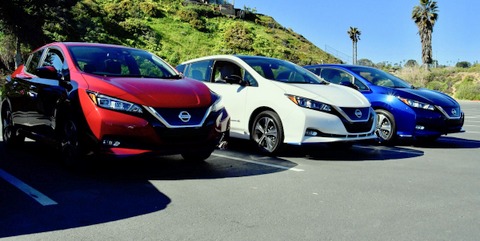
The Leaf Plus will also be cheaper to operate with its exceptional reliability and quality, plus a great warranty that covers not only workmanship, but also battery degradation. If public charging is essential for you, the Leaf Plus includes three years of free-charging with Nissan’s No Charge to Charge (NCTC) program that is available in 57 national Leaf markets with over 2,194 fast-charge locations. That covers over 92 percent of where Leaf’s national installed base is. There are also 792 Nissan dealerships in the U.S. that are Leaf-certified dealers; they have almost 400-fast chargers and 1,860 Level 2 chargers available for customer use.
Our short time with the 2019 Nissan Leaf Plus was delightful. With the increased range, better driving dynamics and a quieter and more comfortable cabin, we believe Nissan has a winner on its hands.
As Clean Fleet Report did with the 2018 Leaf, we will be doing an extended range test with the 2019 Leaf Plus soon. We can hardly wait to tell you what we find. In the meantime, more tech specs on the Leaf Plus can be found here.
The Competition
As of this writing, there are only three 200+ mile-range BEVs that can be considered alternatives to the Leaf Plus (including links to Clean Fleet Report stories on them).
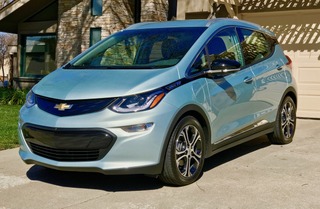
Pros:
Slightly longer range
More compact size
More torque
Cons:
Smaller size and harsher ride
Less cargo space with seats down
Slightly smaller interior
Less sophisticated semi-autonomous and safety systems
Slower charger
Higher price vs. standard equipment
Pros:
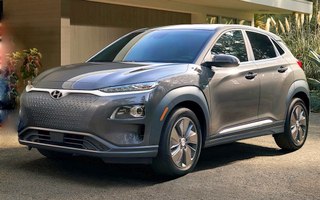
Longer range
More torque
More compact size
Wider track
Longer warranty
Cons:
More expensive for equivalent features
Slightly smaller interior
Harsher ride
Less sophisticated semi-autonomous and safety systems
Less cargo space with seats down
Less performance and hp
Expensive public charging
Pros:
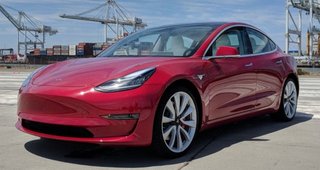
Sophisticated Autopilot option
Longer range option
Larger battery
More powerful motor
Larger passenger compartment
National propriety public charging network
Faster acceleration
Longer wheelbase and wider track
Larger driver and infotainment display
Cons:
Significantly more expensive with options
A less capable infotainment system
Less cargo space
Trunk, no hatchback
Minimalist passenger compartment
Limited color/feature choice at base price
Inconsistent vehicle reliability and quality of construction
Pricey public charging
Summary
The mainstream BEV customer is the Nissan Leaf Plus target customer. As with the 40-kWh Leaf, the Leaf Plus offers the best combination of price, value, features, size, range, durability and reliability. The 2019 Leaf Plus will start showing up at Nissan dealers nationwide on March 1. If you are considering a battery electric vehicle, then you must put the Leaf on your list to check out.
Make sure to opt-in to the Clean Fleet Report newsletter (top right of page) to be notified of all new stories and vehicle reviews.
Disclosure:
Clean Fleet Report is loaned free test vehicles from automakers to evaluate, typically for a week at a time. Our road tests are based on this one-week drive of a new vehicle. Because of this we don’t address issues such as long-term reliability or total cost of ownership. In addition, we are often invited to manufacturer events highlighting new vehicles or technology. As part of these events we may be offered free transportation, lodging or meals. We do our best to present our unvarnished evaluations of vehicles and news irrespective of these inducements.
Our focus is on vehicles that offer the best fuel economy in their class, which leads us to emphasize electric cars, plug-in hybrids, hybrids and diesels. We also feature those efficient gas-powered vehicles that are among the top mpg vehicles in their class. In addition, we aim to offer reviews and news on advanced technology and the alternative fuel vehicle market. We welcome any feedback from vehicle owners and are dedicated to providing a forum for alternative viewpoints. Please let us know your views at publisher@cleanfleetreport.com.

7 thoughts on “First Drive: 2019 Nissan Leaf Plus”